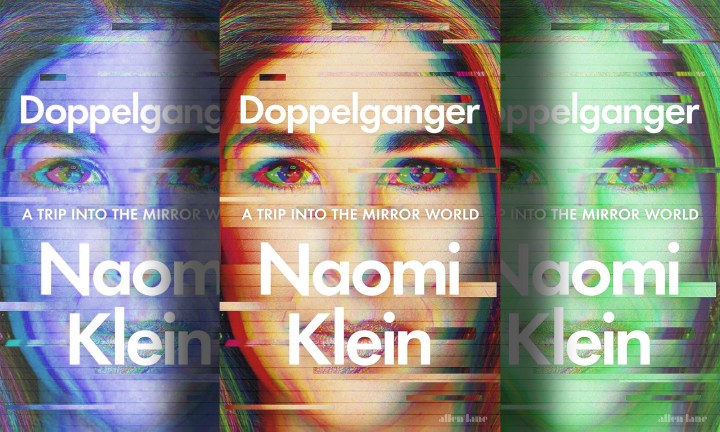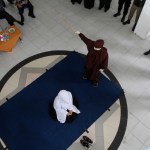BOOK REVIEW
‘Doppelganger, A trip into the Mirror World’ by Naomi Klein

If humanity survives the next half century (and even if it doesn’t) the Klein canon will amount to a prescient record of an unravelling civilisation, by a writer still infused with hope that collectively we could stop it.
At the moment I get the sense that several of the most important new books (fiction as well as non-fiction) are what we might call ‘Covid babies’. Whilst few of them are directly about Covid-19, and those traumatic years, they seem to be products of a distillation of thought that became possible as a result of writers spending long hours in limited spaces and seeing life stripped back to its essence.
One of the great tests of the lockdowns of 2020 and 2021 was whether we could live with ourselves and with those selves closest to us. Naomi Klein’s Doppelganger, A Trip into the Mirror World, published in 2023, is one of these. It is set in a polarised divided world, ironically something that accelerated in government-imposed isolation.
However, the departure point for Klein’s trip into self was her compulsion to explore her divided self, the person she is often confused with on social media, her pesky, contrarian nemesis, the one-time feminist/writer/activist Naomi Wolf.
The person she declares to be her doppelganger.
In this respect, Doppelganger is a remarkable and highly unusual feat of fact-ion. Its core story, when Naomi meets Naomi, has an almost fictional feel to it: it’s a great psychological drama, a tussle between two warring psyches, a complex dance.
But from the intimately personal, Doppelganger expands outwards (as I guess we all do these days) in a stream of associations that tour and analyse some of the greatest challenges and threats of time present and time past: big tech, unregulated social media; disinformation and conspiracy culture; the state’s response to Covid, Donald Trump, Steve Bannon; autism and eugenics; Canadian residential schools and Red Vienna; colonialism and genocide; Zionism and semitism and how — believe it or not — they all intersect in what Slavoj Zizek presciently called “the end times” — even before they had fully revealed their morbid symptoms.
As Klein says in her introduction “Our world has changed, but, like a collective case of jet lag, most of us are still attuned to the rhythms and habits of the place left behind. It’s past time to find our bearings in this new place.”
Creating sense
The book is about finding a compass. And the role of research, journalism and the act of writing, in helping us to do so. Klein puts it this way: “In the torrent of disconnected facts that make up our ‘feeds,’ the role of the researcher-analyst is plain: to try to create some sense, some ordering of events, maps of power.”
Citing personal correspondence with John Berger she says, “Calm, is a form of resistance … the search for calm is why I write; to tame the chaos in my surroundings, in my own mind, and — I hope in the minds of my readers as well”.
But having taken us on an exhausting trip into the Mirror World, Doppelganger ultimately contracts back to the personal.
Recalling a very early encounter with Wolf when she was a student, Klein admits that it was this chance meeting that may have propelled her into writing and that subconsciously she may even have modelled herself on the pre-social media, conspiracy theory Wolf, the author of the daring The Beauty Myth.
Dare I say that Naomi K ultimately finds communion with Naomi W, not politically of course, but with another woman buffeted by the forces of modern times, forces that confront us all and can divert us from what we may think to be our true selves. The self that Samuel Beckett might have called the ‘Not I’ (in his 1972 play of the same name), proves to be intimately connected to the I. The question therefore is who exactly are we in this world of soul capture?
It’s a perplexing question and not a new one. For example, in Waiting for Godot Vladimir complains:
“Astride of a grave and a difficult birth.
Down in the hole, lingeringly, the grave digger puts on the forceps.
We have time to grow old.
The air is full of our cries.
But habit is a great deadener.”
Klein puts it this way:
“If there is anything this journey has taught me, it’s that identity is not fixed. Not mine. Not Wolf’s. Not even the barrier between our two identities. It’s all fluid, shifting around and doubling constantly. Negotiating that doubling — between our younger selves and our older selves, between our public selves and our private selves, between our living selves and our dying selves — is part of what it means to be human. A bigger part of being human, though, and certainly of living a good life, is not about how we make ourselves in those shifting sands of self. It’s about what we make together.”
The devaluation of words and what to do about it?
Doppleganger is a rich and complex piece of research and writing. It extends the best tradition of Klein, whose previous books (including No Logo, The Shock Doctrine, This Changes Everything) mark her out as always writing from the edge; joining dots, uncovering the evil in the ordinary and always, you sense, writing books intended to be of service to those trying to save the world.
But here’s the rub. For me, one of the most paradoxical and disturbing questions raised by the book (which must run to over 300,000 well-thought-out, formulated, researched words) is found in a few pages (pp 151 – 153). Klein’s trip brings about an epiphany where she expresses profound self-doubt about the value of her craft — words.
Read more in Daily Maverick: It’s time to riot – putting poetry back into activism
It happens as Klein is recalling how for a few early months the Covid-19 pandemic made people aware of the possibility of progressive change based on what the virus had revealed of the terrible cost of neoliberalism: social inequality and fatal underinvestment in basic social services. But she laments how the narrative and the language promising a “People’s Recovery” after Covid was soon hijacked by QAnon and the ultra-right. As a result: “Gradually, it has come to feel as if every idea of any import, every word that might express the magnitude of our moment, has been boobytrapped before it can even be uttered.”
Reporting on how one of her friends told her how he felt “totally speechless” because “the fascists have totally taken our language” Klein reflects that:
“The problem of speechlessness goes deeper than the continuous abuse that important words are taking in the Mirror World. I think it may also have to do with a creeping uncertainty about the role words play, their basic utility. Words are still useful for practical purposes, like arranging after-school pickups and making grocery lists and writing catchy songs — but for changing the world? …”
She goes on:
“But here’s the question that has been eating away at me: What if our books, and our movements as they are currently constructed (often in ways that resemble corporate brands), are only changing words? What if words — written on the page or shouted in protest — change only what people and institutions say, and not what they do?…
“That is the real source of my speechlessness in this unreal period: a feeling of near-violent rupture between the world of words and the world beyond them.”
Reassuring herself that “In recent years left social movements have won huge victories in transforming the way we talk about all kinds of issues — billionaires and oligarchic rule, climate breakdown, white supremacy, prison abolition, gender identity, Palestinian rights, sexual violence” she nonetheless worries why “on almost every front, tangible ground is being lost”.
Yes, “we did change the discourse,” she agrees. “But we appear to have done it at the precise moment when words and ideas underwent a radical currency devaluation, a crash connected in ways we have barely begun to understand, to the torrent of words in which we are swimming on those screens.”
Klein concludes “These are difficult things to write and talk about because all we have are those very same cheapened words.”
Much later in the book (in two outstanding chapters exploring her ethnic identity as a Jewish person and the Israel/Palestine conflict — chapters she has made available free online to assist people in understanding the Gaza genocide) Klein seems to find inspiration from the martyrdom of Abram Leon, a Belgian Jewish intellectual whose analysis of anti-semitism (The Jewish Question: A Marxist Interpretation by Abram Leon) Klein praises.
Abram was murdered in Auschwitz in 1944 when he was 26. Klein reflects: “what moves me most about Leon’s short life is his faith in ideas. Even surrounded on all sides by mass slaughter, even under such personal circumstances, he still managed to believe that words and analysis and research mattered, that they still had the power to break an evil spell. Even if those words were too late to matter for him.” (p 294)
You sense that that restores her raison d’être and energy as a writer. Doppleganger gets finished …
If humanity survives the next half century (and even if it doesn’t) the Klein canon will amount to a prescient record of an unravelling civilisation, by a writer still infused with hope that collectively we could stop it.
Nonetheless, in a world awash with words Doppelganger compels us to consider what is happening to their power for persuasion rather than further polarisation? If there is really a danger that words, which have been so powerful throughout history as agents of change, are losing their meaning, being devalued, where does that leave us as a species that has been so dependent on thought and reason, based on science, captured in words, throughout history?
For me, great writing has an intrinsic value and beauty that — fortunately — can never be taken away. But, as the vehicle for persuasion? There again is the rub, that should have more activist tongues wagging. DM
Writers’ note: Writing about Doppelganger led me back to some of my own recent attempts to grapple with writing and reading and their place in trying to fix human civilisation. Read: On reading poetry and quarrelling with myself ; Tempest and Shafak On Connection and Numbness; Art, beauty, death: Reflections on Nick Cave’s new book; ‘Beauty is a basic human need’ – talking about art, justice and joy; Great women writing on great women’s writing


















 Become an Insider
Become an Insider
Brilliant review Mark. Thank you.